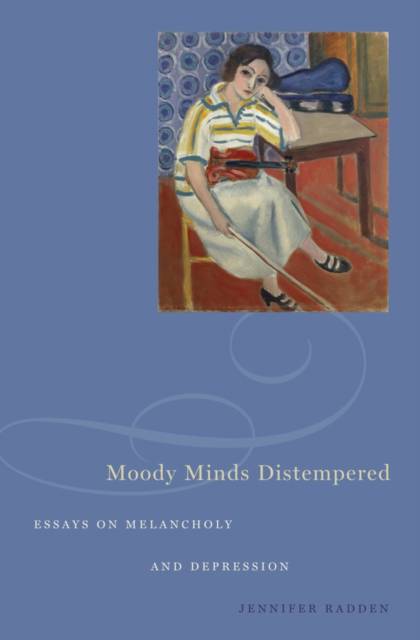
Door een staking bij bpost kan je online bestelling op dit moment iets langer onderweg zijn dan voorzien. Dringend iets nodig? Onze winkels ontvangen jou met open armen!
- Afhalen na 1 uur in een winkel met voorraad
- Gratis thuislevering in België vanaf € 30
- Ruim aanbod met 7 miljoen producten
Door een staking bij bpost kan je online bestelling op dit moment iets langer onderweg zijn dan voorzien. Dringend iets nodig? Onze winkels ontvangen jou met open armen!
- Afhalen na 1 uur in een winkel met voorraad
- Gratis thuislevering in België vanaf € 30
- Ruim aanbod met 7 miljoen producten
Zoeken
€ 126,95
+ 253 punten
Omschrijving
In Moody Minds Distempered philosopher Jennifer Radden assembles several decades of her research on melancholy and depression. The chapters are ordered into three categories: those about intellectual and medical history of melancholy and depression; those that emphasize aspects of the moral, psychological and medical features of these concepts; and finally, those that explore the sad and apprehensive mood states long associated with melancholy and depressive subjectivity. A newly written introduction maps the conceptual landscape, and draws out the analytic and thematic interconnections between the chapters. Radden emphasizes and develops several new themes: the implications, theoretical phenomenological and moral, of recognizing melancholy and depressive states as mood states; questions of method, as they affect how we understand and characterize claims about melancholy and depression; and the persistence and force of cultural tropes linking such states to brilliance, creativity, and sagacity. Insights from literature and the history of medicine, psychology, and psychiatry are woven together with those from the more recent disciplines of feminist theory and cultural studies. This is interdisciplinary writing at its best-part analytic philosophy, and part history of ideas.
Specificaties
Betrokkenen
- Auteur(s):
- Uitgeverij:
Inhoud
- Aantal bladzijden:
- 208
- Taal:
- Engels
Eigenschappen
- Productcode (EAN):
- 9780195338287
- Verschijningsdatum:
- 12/01/2009
- Uitvoering:
- Hardcover
- Formaat:
- Genaaid
- Afmetingen:
- 236 mm x 160 mm
- Gewicht:
- 467 g

Alleen bij Standaard Boekhandel
+ 253 punten op je klantenkaart van Standaard Boekhandel
Beoordelingen
We publiceren alleen reviews die voldoen aan de voorwaarden voor reviews. Bekijk onze voorwaarden voor reviews.











